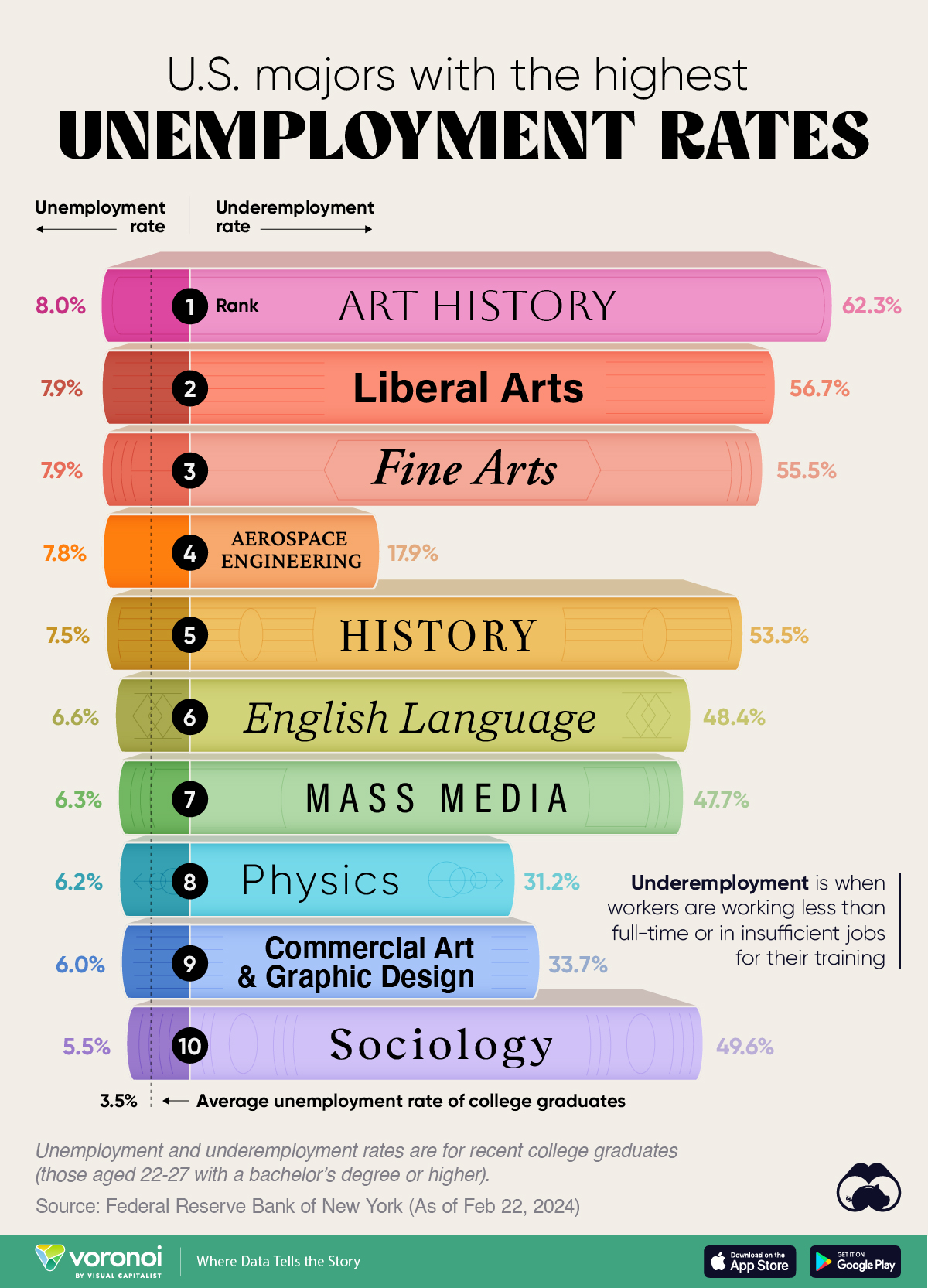What do liberal arts majors do?
Anonymous
only if we knew what the federal reserve bank considers insignificant to their training. maybe people who go into art history have a better understanding of what they'll gain at Sothebys, for example. (they'll gain a rich dh, usually) |
Anonymous
This is the federal reserve data used for the infographic. It's from the Census' American Community Survey - note that the average wages at early and mid-career are for those with a BA only. https://www.newyorkfed.org/research/college-labor-market#--:explore:outcomes-by-major |
Anonymous
I would think she is in good shape. |
Anonymous
The secret to using a liberal arts education to have a good career is that career-minded liberal arts students need to be active in organizations and jobs outside of class. No, a bachelor’s in philosophy probably won’t lead to a great first job, all by itself. But combining a bachelor’s in philosophy with managing ad sales for a college paper with $300,000 per year in ad sales or helping with administration at a medical school office that oversees billions of dollars in research grant requests could lead to a fine first post-college job. |
Anonymous
| All sorts of things. |
Anonymous
Exactly. It's probably going by minimum requirement for the position, but doesn't tell you anything about who usually gets the position. |
Anonymous
| MY DC has a degree in History from a SLAC from a couple of years ago and has a fabulous, meaningful and well-paid job (with a lot of responsibilities) in city government. Is heading to grad school this fall. |
Anonymous
| I was a double history/psych major and got into all of the T5 law schools |
Anonymous
|
Every recruiting/management conversation I have ever had in every job has boiled down to "we just need someone who can think without being told what to do."
Honestly, studying a specific skill in college always seemed like a bad idea to me because its going to be out of date as soon as you leave. Learning how to think and how to learn and how to communicate seem like better things to work on for four years. |
Anonymous
Good luck with that on your resume. Like you said, colleges don't teach specific skills, it's for building foundations. I agree with that. However if your area of foundation is an useless area, then you'll have tough time especially if you go to a mediocre school. That's the reality. |
Anonymous
See, I disagree with your reasoning. You can't look at the majors people chose and conclude their futures--because the people who chose English or art history or whatever on average are more likely to be people who want something different out of life than $$ than the people who chose accounting or engineering. Some may plan on being a SAHP, some may want to be a teacher because that's what people in their family do, some may want to be a struggling artist and take a chance and don't mind working at a coffee shop for that chance. Some may want to understand and change the world and are happy just having enough to live. Some may be just kind of flighty and don't really think about the practical matters of life until they are facing them. Some may have enough family resources not to care all that much. But if you--as a an individual not a generic pattern of data-- want $$ and also want to major in English or Sociology or Studio Art or History or Philosophy or whatever there are paths to do it. You major in English and then do a bootcamp in some marketable skill, you seek out internships that use a marketable skill. You prep hard for the LSAT and go to a top law school. You take your pre-med reqs and go to med school. You network and start your own business. Being a top notch English major with your mind focused on how to get a career will likely serve you better than being a half-a**ed business major thinking your 'marketable' major is going to do it for you. I think it's likely more about mindset than major--it's just that when you look at the data there are going to be more of those with a career-oriented mindset who chose pre-professional majors. |
Anonymous
yep, need grad school |
Anonymous
Where are you getting that it's a "BA" only? It just says "bachelors", which could be a BS. Also, we are only talking about undergrad degrees. As stated many times on this thread, most LA majors either end up in lower paying jobs or go onto grad school. |
Anonymous
The opposite . Physics and art history rates are so similar! |
Anonymous
| Barista, probably. |

